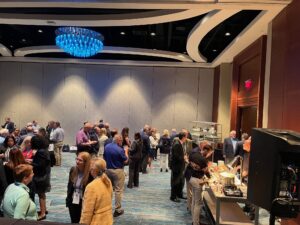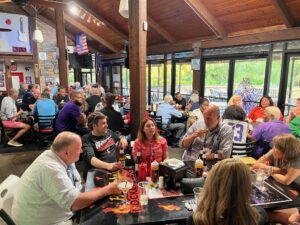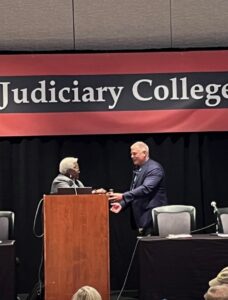By Timothy Conner,
Presiding Judge
TN Workers’ Compensation Appeals Board
Knoxville, TN
Even before I was appointed to serve on Tennessee’s Workers’ Compensation Appeals Board in 2014, I had attended what we referred to as the “Florida Workers’ Comp Conference” on multiple occasions. The firm I was with had many regional and national clients who sent representatives to this conference, and it was an excellent opportunity to reinforce personal connections with many of the people I knew and worked with in the industry.
The first time I attended, circa 2005, I was struck by the sheer vastness of the space, the complexity of the operations, and the breadth of the educational offerings. Invitations were flying around to receptions, dinners, break-outs, and client meet-and-greets. Firms had reserved huge suites for parties. Trays of food and cases of alcohol were being carted all over the hotel. Honestly, I was a little overwhelmed. Being a bit of an introvert, I had to work up the chutzpah to jump into the fray.
I have a vivid memory, in approximately 2011, of walking down the long conference corridor toward the hotel lobby and passing by a roped-off area with a sign that read “Adjudicators and Regulators Only.” “Ooh,” I thought, “that sounds intimidating. I wonder what’s going on in there.” I imagined the dais filled with robed, intimidating-looking jurists engaged in high-level intellectual debate. Thankfully, I never tried to sneak into any of those sessions only to get unceremoniously kicked out by Judge Moore.
Fast forward four years, and suddenly, I am one of the attendees walking through those ropes as a new adjudicator. Contrary to my earlier vision of stuffy intellectuals on lofty pedestals (apologies to Judge Langham), what I found inside was a group of extremely nice and highly intelligent folks just trying to do a good job for the employees and employers of their respective states. What’s more, this gathering was not just about getting to know one another (though that is an important and worthy goal), it was to listen to challenging presentations, discuss best practices, become better writers, consider cutting-edge issues, and cajole each other into perhaps thinking about things a little differently.
I love being part of the NAWCJ. I love this conference. As adjudicators, we typically exist in a pretty small bubble. We have to think about things like, “What will it look like if I attend that reception?” and “Can I meet that person for lunch?” and “Can I ? that post?” We cannot call an attorney-friend and ask, “What do you think about this issue?” or “How would you handle this case?” But (and this is a big but), we can and should reach out to fellow adjudicators and bounce ideas off our colleagues, whether they are from our state or another. Despite every jurisdiction having a workers’ compensation law with different provisions and different language, our workers’ compensation laws have more in common than not. And that “issue of first impression” you are struggling with, very likely, has already been addressed in other states. So, taking care to protect any confidential information, pick up the phone and call an adjudicator colleague, who will be more than willing to serve as a sounding board and “idea-bouncer.”
Of course, that kind of “interstate connectivity” would be much more cumbersome without the NAWCJ and the annual Judicial College. That event, more than any other, has led to me connecting with colleagues from California to Rhode Island, from Texas to Wisconsin, from Florida to Maryland, and many states in between. It is hard to overstate the value of those connections when working in an area of law with such “niche” legal concepts.
What’s more, although the core function of the Judicial College is to offer educational opportunities for adjudicators, equally important are the social events, including the lunches, the Monday reception, and the Tuesday night dinner. Those social settings give our members a chance to connect with colleagues on a personal level, and they enhance the value of attending the College.
According to the Oxford English Dictionary, the word “collegiality” was first used in approximately 1887 and means “companionship and cooperation between colleagues who share responsibility.” Today, according to our AI overlords, the word is used only 0.3 times per million words. As an organization, let’s step up and try to increase the frequency of that word’s usage. In doing so, we can increase cooperation to improve processes, all with an ultimate goal of sharing responsibility to create as fair and robust a workers’ compensation system as possible.


